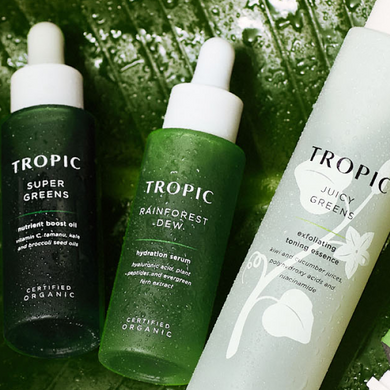Our operations are solely in the UK, and we ship worldwide. We have over 300 employees. We also have 20,000 active independent self-employed Ambassadors across the UK.
Our ingredients and packaging are sourced from over 30 countries. We work with over 100 suppliers to source and grow our ingredients and over 50 suppliers to source our packaging.
Slavery, be it in the form of servitude, forced labour or human trafficking, is not accepted in any part of our supply chain.
Too often, the onus of eliminating modern slavery is placed only on the countries where the crime is perpetrated. They certainly have a responsibility, but they are not alone in this regard. We all have a duty to ensure modern slavery cannot continue.
We’re committed to preventing acts of modern slavery and human trafficking within our business. The Modern Slavery Act (2015) demonstrates the UK’s commitment to leading the global fight against modern slavery.
We uphold our values by working with all our suppliers, implementing preventative measures and remaining vigilant. We ensure high standards with all our suppliers, ensuring that any work we do together helps to create a healthier, greener, more empowered world in line with our Infinite Purpose.
Eliminating slavery in our supply chain/due diligence
We are devoted to incorporating only the freshest, most nourishing ingredients from the world’s most naturally lush regions (including Madagascar, Brazil and Australia), and with that comes an ethical responsibility of due diligence. Each Tropic ingredient is responsibly sourced, adhering to key sustainability initiatives, with a focus on partnering with suppliers who give back to the community.Since 2020, Ingredients and packaging suppliers can only work with us if they’re on our approved supplier/manufacturer list. Each supplier is audited via our questionnaire with an assessment also being conducted.
We ask every supplier to maintain and demonstrate the appropriate and adequate traceability systems within their supply chain, and to agree with our Tropic principles.
What are the Tropic principles?
All ingredient suppliers must meet the Tropic Principles as follows:- Cruelty Free and Vegan Statements (most recent/latest preferably)
- Fairtrade Statement (if applicable)
- Raw Material Sustainability Document (e.g. RSPO palm oil sustainability document, if available)
- Certificate of Natural Origin
- Child labour/Anti-slavery declaration
- Nagoya Compliance (if applicable)
- Cosmos/Ecocert Certificate (if applicable)
Keeping to these principles
When a supplier is approved, regular checks are performed to check they are ensuring their supply chain is free from slavery or child labour. This occurs with every single one of our suppliers.If at any time we suspect a supplier to be involved in an incidence of modern slavery, we follow Home Office guidelines and inform local government and law enforcement bodies.
We also routinely contact our suppliers, establishing how they proactively further empower their entire supply chain. Transparency is key, and plays a huge part in ensuring a strong relationship with us. We have implemented the question of living wages for all our suppliers, asking all our current suppliers how they ensure they pay their workers a fair wage.
All staff employed by Tropic work a maximum of 45 hours a week, should they wish to do overtime, they can sign a 48-hour opt-out agreement. Regular welfare checks with staff are regularly undertaken, should the staff member need to contact anyone for help, support or assistance.
As of 2022, nearly all of our recruitment (>95%) is done in-house. This helps to eliminate any risk of forced labour. We plan to further increase this so that, where possible, all employees are recruited in-house.
We follow the latest Right To Work checks published by the Home Office, with all the correct documentation such as visas and tracked biometrics, with systems in place to ensure validity.
More than 98% of our products sold are made in-house at our HQ, the remaining percentage are made elsewhere such as elsewhere in the UK, France, South Korea. With all our manufacturing suppliers, we have an agreement that they will not subcontract any of the manufacturing, packaging, labelling or testing and analysis of our products to a third party without our prior written permission. We also have the ability and power to audit all of our manufacturing suppliers.
Where do we establish risk?
Where there are potential risk areas in our supply chains, such as the ingredient mica, which has been related to child labour violations in various countries, we take proactive action. We source all our mica entirely from the USA, to eliminate any risk of slavery or human trafficking taking place within our business or supply chains. Our mica suppliers are also part of the RMI (Responsible Mica Initiative). While they don't source mica from countries associated with child labour or slavery, they still help to improve the situation in those regions.We will not work with any suppliers who cannot commit to supporting the eradication of modern slavery and human trafficking. That’s why we’ve asked every single one of our suppliers to send their latest copy of their Modern Slavery Statement. When a statement is not in date or does not adequately address risks, we send our questionnaire to explicitly ask them the steps they are taking to assess this risk.
Failure to meet our standard or to return the questionnaire fully completed will result in us notifying them that they have been deemed as a supplier which is high risk, and therefore, we will be looking for an alternative supplier who can demonstrate their commitment against modern slavery.
We also are committed to working with suppliers who actively take a proactive approach in empowering supply chains. For our Shea Butter, we have built a relationship with AAK, for whom sustainable sourcing is a top priority. The Kolo Nafaso programme – developed and run by AAK – is a direct purchasing scheme that aims to support women wild-harvesting shea kernels across Western Africa. The programme aims to equip these women with the valuable tools to trade with whomever they choose. There are no unwanted contracts, with a system based on fair trade principles. Eliminating restrictive practices and allowing leverage to negotiate their terms and ensures that the shea nuts can be sold for a fair price.
Last year, we implemented knowledge from the Global Slavery Index when sourcing suppliers. In particular, we’ll be ensuring any suppliers that source from a country with an estimated prevalence of 10 or higher victims per 1,000 population, will be extra scrutinised for transparency.
How are we taking steps
As of this year, no less than 14 of our products are certified COSMOS organic with the Soil Association. With this certification, the entire supply chain is considered. This means that all facilities are inspected by an independent third party. The final goal of this certification is to deal with the issues that are essential for the environment and for the well-being of humans on the planet.Our HQ and manufacturing process was audited by the Soil Association and awarded COSMOS organic and COSMOS natural accreditation. This standard includes no forced or involuntary labour and ensures child labour does not occur at any stage. We also manufacture in accordance with Good Manufacturing Practices.
Training staff about modern slavery
As our business grows, it is important all staff are aware of the modern slavery act and Tropic’s anti-slavery and human trafficking policy. As of 2022, all staff employed by Tropic are being trained in the potential signs of modern slavery as well as the correct course of action to take. As part of their induction, all Tropic staff are made aware of the potential signs of modern slavery and now to take the appropriate action if modern slavery is suspected.Managers, supervisors, and the entire Human Resources team have also been given additional training and resources laid out by The Gangmasters and Labour Abuse Authority from the Home Office.
We have our own Confidential Reporting policy available to everyone employed at Tropic irrespective of the length of service or position. We also have an Anti-Bribery and Corruption Policy and Workplace Harassment Policy. Any complaints or grievances are always recorded in writing and kept on record.
Steps to improve and investigate any complaints are then taken very seriously. Likewise, we ensure all staff members have multiple ways of reaching out with any concerns about their welfare or others by email, phone or directly to their Manager or Human Resources team.
Other ethical commitments against slavery and human trafficking
As the Overseas Development Institute reports “Child labour, which remains endemic in many poor countries...keeps children out of school, hinders effective learning and denies children an opportunity to acquire the knowledge and skills they need to escape poverty, and that their countries need to drive inclusive growth and human development.” Women and girls are disproportionately vulnerable to modern slavery, accounting for 71% of all victims.
After the effects of COVID-19, 24 million children may never go back to school after lockdown. Through our charity partnership with United World Schools, since September 2019 we’ve helped to educate tens of thousands of children. Every child deserves the chance to go to school. Children from remote, impoverished communities across the world want the same opportunity. They are determined to break out of poverty and they know that education is the key to a brighter future. Myanmar and Cambodia especially are countries where an estimated 1% of the population are victims of slavery and have some of the highest rates in the world. While the primary purpose is to educate, our partnership with United World Schools helps to eliminate child labour through their network in Cambodia, Myanmar and Nepal.
We all must realise that our choices can continue the perpetuation of slavery, or we can all work together to fight it and put an end to it. We sit firmly in the latter mission. And as part of our Infinite Purpose to help create a healthier, greener, more empowered world, we will continue to do so.
This statement is made in accordance with section 54(1) of the Modern Slavery Act 2015 and constitutes Tropic Skincare Limited’s slavery and human trafficking statement for the financial period ending 31 December 2022.
Tropic Skincare approved this statement.

Signed Susie Ma
Date: 27th June 2023
Director For and Behalf of the Board
2021 Modern Slavery Statement here

 Skincare
Skincare
 Sale
Sale
 Bestsellers
Bestsellers
 Makeup
Makeup
 Body Care
Body Care
 Men's
Men's
 Hair Care
Hair Care
 Mama & Baby
Mama & Baby
